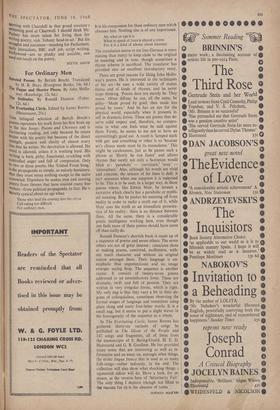For Ordinary Men
The Everlasting Circle. Edited by James Reeves. (Heinemann, 25s.) rests bilingual selection of Bertolt Brecht's Poems represents his work from his first book up to the late Songs, Poems and Choruses and is brains reading, not only because he mixes brains with his poetry but because of the direct strength, passion and clarity of almost every line that he writes. No decoration is allowed. No word is allowed, unless it is working hard. His writing is bare, pithy, functional, crackling with controlled anger and full of compassion. Only in two or three poems, like 'United Front Song,' is the propaganda so simple, so naïvely hortatory, that they must mean nothing except to the naïve converted. Elsewhere he makes true and moving Poetry from themes that have resisted many fine writers—from political propaganda, in fact. He is bitterly cynical about an age when Those who lead the country into the abyss
Call ruling too difficult For ordinary men.
It is his compassion for these ordinary men which obsesses him. Nothing else is of any importance.
Ah, what an age it is When to speak of trees is almost a crime For it is a kind of silence about injustice.
The translation seems to me (my German is more missing than rusty) to keep close to the original in meaning and in tone, though sometimes a rhyme scheme is sacrificed. The translator has provided also an excellent introductory essay.
There are good reasons for liking John Hollo- way's poems. He is interested in the techniques of his art—he uses a wide variety of stanza forms and of kinds of rhymes, and he never stops thinking. 'Poems dare not merely be. They mean.' Often diffuse, he can, all the same, be pithy—Wade proud by grief, then made less proud by more.' And he has an eye for the physical world, especially when it presents it- self in dramatic forms. These are poems that de- serve solid respect and, therefore, no compro- mise in what one feels must be said against them. Firstly, he seems to me not to have an unremittingly good ear. A room is 'lamped stark with gas' and something or other is so 'because art's climax needs must be its mausoleum.' This might be carelessness, just as he passes such a phrase as 'Slowly he ran faster' and allows rhymes that surely not only a Scotsman would blink at : 'parabola' — 'curvature,' area' 'atmosphere.' Also, although his words are vivid and concrete, the texture of his lines is dull; it isn't sensuous when one supposes it is supposed to be. This is to be seen, in a larger way, in those poems where, like Edwin Muir, he invents a narrative which clearly has a parabolic or mythi- cal meaning. But he pushes his meaning off from reality in order to make a myth out of it, while Muir uses his myth as an immediate presenta- tion of his reality : there is no distance between them. All the same, there is a considerable poetic intelligence working here, even though one feels more of these poems should have come off than really do.
Ronald Duncan's shortish book is made up of a sequence of poems and seven others. The seven others are not of great interest : conscious shots at making poems, contrived, inoffensive, with- out much character and without an original notion amongst them. Their language is un- emphatic (but unpretentious) and no image emerges saying Stop. The sequence is another matter. It consists of twenty-seven poems addressed to an unsatisfactory lover. These are dramatic, swift and full of passion. They are written in very irregular forms, which is right. My only nag is that they vary a bit in their de- grees of colloquialism, sometimes observing the formal usages of language and sometimes using plain. slang and nasty four-letter words. It is a small nag, but it seems to put a slight waver in the homogeneity of the sequence as a whole.
In The Everlasting Circle, James Reeves has gathered thirty-six variants of songs he published in The Idiom of the People and 142 songs and fragments, all of them from the manuscripts of S. Baring-Gould, H. E. D. Hammond and G. B. Gardiner. He has provided many notes that are interesting as well as in- formative and an essay on, amongst other things, the erotic lingua franca that is used in so many folk-songs—rather tediously, in the end. The collection will also show what shocking things a squeamish editor will do. Have a look, for in- stance, at the version here of 'Strawberry Fair.' The only thing I deplore (though not blind to the reasons for it) is the absence of tunes.
NORMAN maccAtu










































 Previous page
Previous page